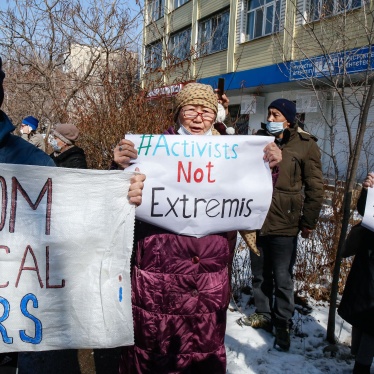When Gordon Brown takes over as British prime minister later this month, his government should revamp UK counterterrorism policies that have undermined human rights and alienated communities whose cooperation is vital to combat terrorism, Human Rights Watch said in a briefing paper released today.
Since September 11, 2001, Britain has introduced a series of security measures that violate human rights. These measures include indefinite detention, control orders, and efforts based on empty promises of humane treatment to return terrorism suspects to countries where they face torture. Earlier this month, the government signaled its intention to introduce new counterterrorism legislation later this year, including a renewed attempt to allow terrorism suspects to be detained for 90 days without charge.
“The Blair government’s counterterrorism policies have breached human rights, damaged relations with the country’s Muslims, and tarnished Britain’s standing abroad,” said Benjamin Ward, Europe and Central Asia associate director at Human Rights Watch. “A change of course is urgently needed.”
Human Rights Watch’s 22-page briefing paper, “Hearts and Minds: Putting Human Rights at the Center of United Kingdom Counterterrorism Policy,” assesses British security measures introduced since 9/11. It describes how the policies have weakened the global ban on torture and ill-treatment, restricted the right to liberty without appropriate safeguards, and unduly interfered with the right to freedom of expression.
The paper argues that setting aside human rights in the name of security is not only illegal under international law, but also counterproductive. Preventing radicalization and recruitment has been a central plank in the government’s counterterrorism strategy since the London transport attacks of July 2005. But abusive counterterrorism measures erode public trust in law enforcement and security services and alienate communities whose cooperation is vital in the fight against terrorism. Such measures undermine the UK’s moral legitimacy at home and abroad, damaging its ability to win the battle of ideas that Gordon Brown has acknowledged as central to countering terrorism.
“If Brown is serious about winning hearts and minds, he needs to put human rights back into Britain’s security policy,” said Ward. “That means making sure that his government’s counterterrorism policies uphold human rights, including the global ban on torture.”
The paper outlines problematic areas of the UK’s counterterrorism policies, including:
- The government’s use of unreliable promises contained in “memorandums of understanding” to return terrorism suspects to countries, including Jordan and Libya, where they face the risk of torture. The government has pursued this policy despite clear evidence that such “diplomatic assurances” from countries where torture is a problem are an ineffective safeguard against abuse.
- The UK’s attempts to persuade the European Court of Human Rights to overturn long-standing case law by allowing an exception on the total ban on returns to risk of ill-treatment. The UK is arguing for the change in an intervention in the case of Ramzy v. the Netherlands (a dispute about whether an Algerian terrorism suspect will face torture if he is returned to his home country).
- The extension of the period that terrorism suspects can be detained without charge from 14 to 28 days, the longest in the European Union. The government has signaled it intends to renew efforts to extend pre-charge detention to 90 days – equivalent to the average time served in a six-month prison sentence – despite the lack of any evidence that such an extraordinary period is needed to investigate those suspected of terrorism offences.
- The use of control orders that seriously restrict liberty on the basis of evidence that falls well below that required to convict a person for a crime. British courts have already struck down eight out of 19 control orders issued on the grounds that they breached human rights.
- The government’s enactment into law of the offense of “encouragement of terrorism,” which criminalizes “glorification” of terrorism in a way that at best has a chilling effect on free speech and at worst violates the right to free expression.
- The government’s refusal to allow the use of intercept evidence, acquired by phone tap, to facilitate the prosecution of those accused of involvement in terrorism. The UK is the only Western country with such a total ban. Earlier this month, the government’s “discussion paper” on proposed counterterrorism legislation indicated a review of the ban by a committee of privy counsellors.
The briefing paper contains concrete recommendations to Gordon Brown and his new government. Human Rights Watch calls on the incoming Brown government to put an end to the policy of deportation to risk of torture and also to withdraw from the Ramzy v. the Netherlands case at the European Court of Human Rights. The government should stop seeking a further extension of pre-charge detention, and it should implement better safeguards for control orders. It should also repeal the offense of encouragement of terrorism, and end the ban on using intercept evidence in criminal trials.






